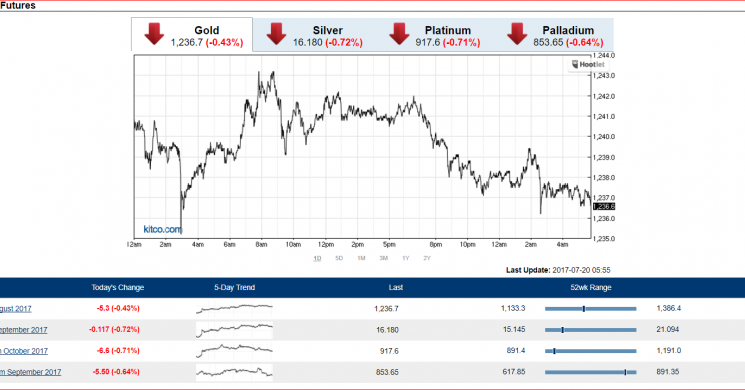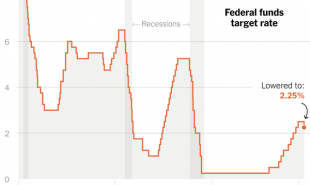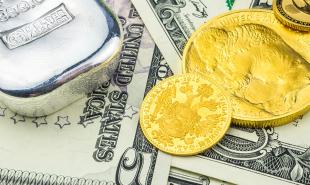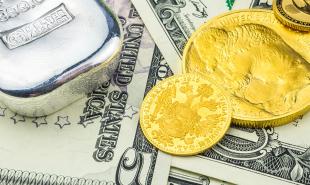
Before the Data
- Decision day at the ECB,
- China-U.S. relations turn frosty
- France says U.K. must pay.
Gold Today
From Reuters
The ECB is expected to lay the groundwork for an autumn policy shift when it meets, emphasising improved growth while tempering expectations after previously setting off a
mini-tantrum in financial markets.
That comes after the Bank of Japan kept monetary policy steady and pushed back against the timing for achieving its 2
percent inflation target.
"Investors remained cautious heading into (Thursday's) ECBmeeting, where there are expectations of a more hawkish stance,"ANZ research said in a note.
Central banks
The European Central Bank will announce its latest policy decision at 7:45 a.m. Eastern Time. With every economist surveyed by Bloomberg expecting no rate changes, attention will turn to the press conference 45 minutes later, with investors looking for any hints in President Mario Draghi's comments on future stimulus reduction. Overnight, the Bank of Japan announced it was maintaining its policy position unchanged, while yet again delaying the deadline to hit 2 percent inflation. The decision means the bank is increasingly out of step with its developed-world peers.
Disagreeing on disagreements
Relations between the world's two largest economies turned frosty as high-level economic talks between China and the U.S. in Washington broke up without the two powers even able to agree on a joint statement to describe their disagreement. Commerce Secretary Wilbur Ross had scolded China over its trade imbalance with the U.S. in his opening remarks, and the meeting, which was attended by Federal Reserve Chair Janet Yellen, failed to produce any concrete commitments from the Chinese delegation. The Trump administration, meanwhile, claimed a dramatic slowdown in new government regulations since President Donald Trump took office, saying the number of economically significant rules has been halved since 2016.
Show us the money
France has insisted that the U.K. pay a Brexit bill of as much as 100 billion euros ($115 billion), with the country's Finance Minister Bruno Le Maire saying while the amount due was up for debate, the U.K. must pay what it owes as a "non-negotiable prerequisite at the start of talks." British Prime Minister Theresa May has been urged to do more to reassure businesses about her Brexit strategy ahead of a consultation with companies in Downing Street today. There was some good news for May in U.K. retail data released this morning that showed a rebound of 0.6 percent in June, ahead of forecasts, as warming temperatures boosted clothing sales.
Markets rise
Overnight, the MSCI Asia Pacific Index was unchanged, while Japan's Topix index rallied 0.7 percent following the Bank of Japan decision. In Europe, the Stoxx 600 Index was 0.1 percent higher as investors awaited the ECB decision and press conference. S&P 500 futures were broadly unchanged after the index set another record closing high yesterday.
Coming up...
It's Thursday, so weekly initial jobless claims data are due at 8:30 a.m., with expectations for a slight decrease from last week's total to 245,000. In earnings today, we get reports from Microsoft Corp., eBay Inc., and Bank of New York Mellon Corp. Yesterday's big bank earnings reports showed Morgan Stanley posted more fixed-income revenue than Goldman Sachs Inc. for the second quarter in a row.
Debt Ceiling Bluff May Be called in 2017
A kink is emerging. If you look at the very short end of the U.S. yield curve, you can see that Treasury bills maturing in late October are yielding more than those that mature in November. The reason is that the U.S. is expected to hit the debt ceiling sometime around then, and so anxiety about a payment being delayed shows up there. Now, this still pretty minor stuff, and we saw similar kinks during recent debt ceiling fights. And of course, those earlier skirmishes ended with the bomb getting defused before it went off. But the dynamics are slightly different this time around. Under Obama, it was the opposition party presenting the biggest challenge to a debt ceiling hike. Under Trump, it's a contingent within the majority party posing the biggest challenge! It's a bit of a twist, and although there's no good political reason for the GOP to shoot itself in the foot, well... we'll just leave that one there. There's one other critical difference between recent fights and this one. According to Fed transcripts released earlier this year, central bankers back in 2011 were briefed by the Treasury on a plan to make principal and interest payments even in the event the debt ceiling were hit. At the time, it was never even clear that such a plan was technically feasible (let alone whether it existed.) But the very effort to hatch a plan has spurred an assumption that it is. So what makes 2017 different is that lawmakers may have reason to think we can safely hit the limit, without consequence. Whether that emboldens the debt ceiling holdouts and changes the game theory of it all remains to be seen.

Read more by Soren K.Group







